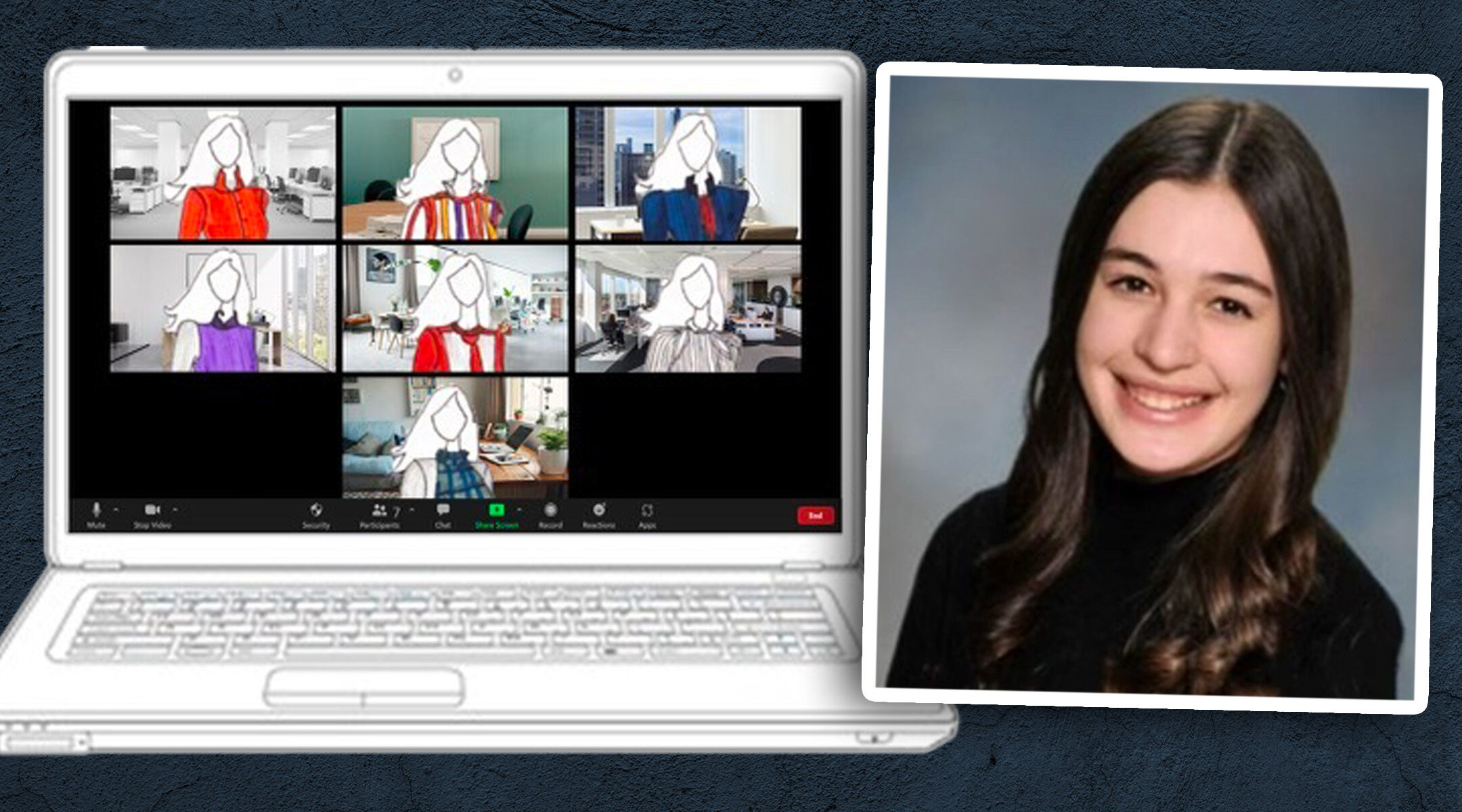(New York Jewish Week) —Rina Finkelstein, a recent graduate of the Sy Syms School of Business at Yeshiva University, will be the first to admit that a career in fashion might not be the most obvious choice for an accounting major.
Growing up in Teaneck, New Jersey, Finkelstein was interested in fashion and art from a young age and taught herself how to sew and sketch from books and YouTube.
Despite that, Finkelstein believes it is her business background that most inspired “MOD ern/est,” a women’s concept clothing line that focuses on “top half, face-framing looks for virtual calls” — that is, Zoom-ready clothing that can transition into stylish and comfortable looks when the camera is off.
In a proposal that she wrote as part of a fashion fundamentals class in the business school in the spring of 2021, Finkelstein writes that the four main focuses of the clothing line are “flexibility, ease, visibility, and modesty.”
“The way I approached this prompt was by starting off on the business side and thinking about who the customer is, what they need and where the world is going in terms of business attire,” Finkelstein said. “Everything was on Zoom for a long time. Now there’s been a push to adopt more of the hybrid model. So I was really trying to understand what’s going on in the world and build off of that.”
Her workwear, appropriate for a post-pandemic hybrid lifestyle, combines flowy, comfortable knee-length skirts paired with high-necked, brightly colored sweaters, jackets and blouses. The clothes are meant to make the wearer feel confident and powerful while also being comfortable and modest according to the standards of her Modern Orthodox Jewish community: covered elbows, collarbone and knees.
“The external definitely influences the internal so if you feel great and you look great, then you’ll probably act great,” Finkelstein said.
As part of the class, Finkelstein and her peers learned how to turn their fashion line ideas into business proposals.
By the end of the semester, at the recommendation of Prof. Adam Sternbach, who teaches at Parsons School of Design as well as Yeshiva University, Finkelstein applied to the Fashion Scholarship Fund, a nonprofit dedicated to fashion and business education.
At the end of 2021, Finkelstein learned she was one of 123 scholarship recipients out of thousands of applicants from universities around the country, who were awarded a total of $1 million as a class. Finkelstein’s $7,500 scholarship for “MOD ern/est” was awarded in the design and product development category.
“I was really shocked,” Finkelstein, 22, said, upon learning she received the award. “I did it because it was an enjoyable experience for me to learn more about fashion and try it out. But I never thought I was going to win.”
Along with the monetary award, scholarship winners are invited to participate in professional development seminars, workshops and career fairs to network with peers and advance their potential careers in the fashion industry. Stern College became an affiliate school of the Fashion Scholarship Fund — a prerequisite for the scholarship — in 2015, after years of partnering with the Fashion Institute of Technology to allow students interested in fashion to take courses there.
“We congratulate Rina on her impressive and innovative accomplishment,” said Yeshiva University Dean Karen Bacon. “Through YU’s affiliation with other schools and programs, as well as our diverse course offerings, YU is dedicated to creating leaders of tomorrow and Rina’s prestigious award is an example of how we’re helping to open doors for our students. We couldn’t be more proud.”
Finkelstein said her pieces were inspired by an exhibit she visited about a decade ago at the Metropolitan Museum of Art called “Schiaparelli and Prada: Impossible Conversations.” The pieces in the exhibit focus on outfits that would make the wearer look attractive while sitting down, which Finkelstein remembered when the world transitioned to Zoom meetings at the beginning of the pandemic.
She added that her friends and family members were especially excited that the clothing line featured items that were “modest, but also interesting and innovative.”
Though her clothing line concept may not actually come to fruition — it was just a case study — Finkelstein said the scholarship was a great learning experience. She hopes that, using the connections she made through the Fashion Scholarship Fund, she can pursue a career in the business side of the fashion industry, focusing on strategy and appealing to the everyday customer.
“It was definitely a long shot to enter a fashion competition,” Finkelstein admitted. “I worked through it, took the case step by step and really enjoyed myself. I’ve learned a lot throughout the process. I would just say to whoever else wants to try something new — try it out. You never know where it could go.”
The New York Jewish Week brings you the stories behind the headlines, keeping you connected to Jewish life in New York. Help sustain the reporting you trust by donating today.





